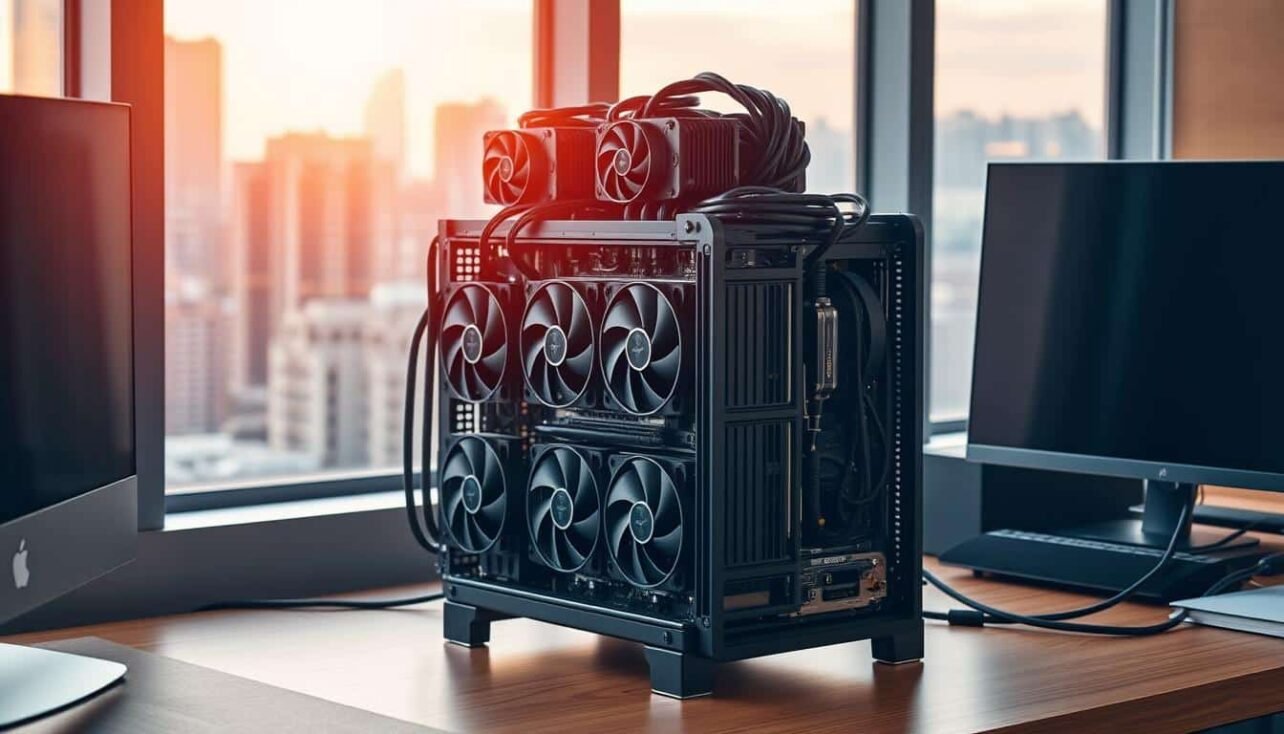Mining cryptocurrency legally in the USA means following federal, state, and local rules. This guide helps you mine cryptocurrency legally in the USA. It ensures you comply with laws when starting or growing your mining operations. You’ll learn how to avoid legal issues and follow U.S. rules.
More people in the USA are interested in mining cryptocurrency. This article covers tax reporting, choosing the right hardware, and getting necessary permits. Mining legally helps you avoid penalties and ensures your success in the long run.
Key Takeaways
- Legal cryptocurrency mining involves state-specific laws and federal reporting.
- Taxes apply to mining rewards, requiring IRS filings for income and expenses.
- Check local zoning laws before setting up hardware to avoid fines.
- Compliance includes choosing licensed mining software and avoiding scams.
- Renewable energy use can reduce environmental impact and meet regulations.
Understanding Cryptocurrency Mining Fundamentals
Cryptocurrency mining is key to digital currencies like Bitcoin and Ethereum. To follow cryptocurrency mining guidelines well, miners need to understand the basics. This part explains the technical steps and their effects in the real world.
What Is Cryptocurrency Mining?
Miners use special hardware to solve complex puzzles. Each solved puzzle checks transactions, adding them to the blockchain as a new block. This task needs a lot of power, turning electricity into digital security.
How Mining Secures Blockchain Networks
Miners compete to solve equations, creating a decentralized audit system. Their efforts stop fraud and double-spending, making the system trustworthy. This is why mining cryptocurrency in compliance with rules is so important.
Mining Rewards and Incentives
Miners get new coins (block rewards) and transaction fees. Bitcoin’s reward halves every four years, affecting profits. Knowing this helps miners match their investments with legal reporting needs.
The Legal Landscape of Cryptocurrency in the United States
Cryptocurrency mining rules in the U.S. are complex. Mining is legal everywhere, but following the laws is tricky. This part explains how these rules affect miners.
Federal Regulations Affecting Miners
Federal agencies set the main rules for mining. The SEC watches over securities, and FinCEN deals with money laundering. The IRS sees mined coins as taxable, so miners must report correctly. Keeping up with these cryptocurrency mining regulations is crucial to avoid fines.
State-by-State Regulatory Differences
- Wyoming has good policies with no mining bans.
- New York has strict rules under the BitLicense.
- Texas is all about energy but lacks crypto laws.
Key Regulatory Bodies Overseeing Cryptocurrency
Agencies like the CFTC handle derivatives, and the FTC fights fraud. Miners need to watch these groups for updates on USA mining laws.
How to Mine Cryptocurrency Legally in the USA
Starting to mine cryptocurrency legally in the USA needs careful planning. Follow this roadmap to meet legal requirements for mining cryptocurrency in the U.S. First, research federal and state laws that affect your area. Also, check IRS guidelines for income and tax rules.
Energy use and zoning rules differ by location. Make sure you have the right local permits before buying equipment.
- Verify local zoning laws and utility agreements to avoid violations.
- Register your business entity, like an LLC, to separate personal and operational finances.
- Set up accounting systems to track rewards, expenses, and tax liabilities.
- Consult attorneys specializing in cryptocurrency law to review compliance gaps.
Power consumption is also key to legal compliance. Many places require proof of renewable energy use or efficiency standards. Before buying hardware, check electricity costs and grid availability.
Miners in states like Texas or Wyoming face different rules than those in California or New York. Stay updated on state-specific rules to avoid penalties.
Legal compliance also means choosing mining software and pools that follow U.S. regulations. Avoid platforms without clear terms. Keep business licenses and tax filings up to date as your operation grows. Ignoring these steps could lead to fines or shutdowns.
Essential Legal Requirements Before Starting Your Mining Operation

Before you start, miners must follow legal requirements for mining cryptocurrency in the U.S. This ensures you avoid fines and legal trouble. Here are key steps to start right.
Business Registration and Licensing
First, register your mining as a formal business. You can choose from sole proprietorships, LLCs, or corporations. Each type has its own tax and liability benefits.
For example, LLCs protect your personal assets and make profit reporting easier.
Zoning and Local Permits
- Check local zoning laws: Many cities restrict industrial equipment in residential areas.
- Secure permits for high-energy usage if operating large-scale setups.
- Verify noise and electrical code compliance with local authorities.
Compliance Documentation
Keep records of your hardware, energy contracts, and mining logs. This is for audits. Also, track your income and expenses to meet IRS rules. Store all licenses and permits in one place.
Staying compliant with mining cryptocurrency in compliance needs constant effort. Always check for new rules. Get advice from legal experts to fit your state’s laws.
Choosing the Right Mining Hardware While Staying Compliant
Choosing mining hardware is a balance between performance and legal rules. You must follow USA mining regulations for crypto. This means picking hardware that fits local electrical codes.
Using too much power or unapproved devices can lead to fines or shutdowns.
- Electrical Compliance: Check state and local power limits. High-wattage hardware must align with building codes to avoid violations.
- FCC Certification: All devices must display FCC certification to ensure they comply with radio frequency emission standards.
- Import Restrictions: Avoid hardware sourced from sanctioned countries. Verify manufacturer origins to adhere to USA mining regulations for crypto.
- Documentation: Track purchase dates and costs for tax reporting. Cryptocurrency mining guidelines require clear records for IRS compliance.
Look for brands like Bitmain or MicroBT that list compliance details. Always keep proof of purchase and certifications handy. Check with local utilities to make sure your energy use is okay.
Using non-compliant hardware can lead to legal trouble or even losing your equipment. Choose brands with clear supply chains to avoid sanctions. Keeping good records helps with audits and tax filings.
Setting Up a Legal Mining Operation: Location Considerations
Choosing the right location is key to following USA mining laws for legal cryptocurrency mining. Local zoning, energy, and community rules all play a part. Not considering these can lead to fines or losing your equipment.
Residential vs. Commercial Mining
Homeowners face special rules. HOA rules or rental agreements might ban mining gear. Commercial places need zoning permits for high energy use.
Residential miners must check utility capacity and noise limits before starting. Commercial sites might need environmental impact assessments in some states.
Power Consumption Regulations
- Electrical systems must meet NEC (National Electrical Code) standards for high-load equipment.
- Utilities like Xcel Energy or Pacific Gas & Electric require pre-approval for load increases over 50 kW.
- Some states offer tiered electricity rates for continuous high-usage customers.
Noise and Heat Ordinances
Cities like Austin, Texas, have 55 decibel limits after 9 PM. Mining setups need industrial cooling to avoid heat buildup. Operators in apartment complexes risk eviction for noise violations. Keeping records of local code compliance helps avoid disputes.
Software Requirements and Legal Mining Pools
Following cryptocurrency mining regulations means choosing the right software. Use mining software from trusted sources to stay legal. Using unapproved software can lead to legal trouble and expose you to malware.
Always check the end-user license agreements. This ensures your mining activities are legal in the USA.
Joining mining pools can be tricky due to legal issues. Pools outside the U.S. might need to report profits to U.S. tax authorities. Miners must keep track of transactions for IRS Form 1040.
Pools based abroad could face dual regulations under FATF guidelines. This affects miners too.
Important things to think about when joining a pool include:
- Payout structures and tax documentation provided by the pool
- Pool location and adherence to OFAC sanctions lists
- Anti-money laundering (AML) policies enforced by the pool
Solo miners don’t face pool-related legal issues but see more reward volatility. Both solo and pool mining require keeping records of software updates and agreements. Regularly check your mining software to avoid breaking federal laws.
Energy Consumption: Legal and Environmental Compliance
Crypto mining is growing, and so is the focus on energy use. Miners must follow USA mining regulations for crypto to be green. Using eco-friendly methods helps them meet rules and stay ahead.

Renewable Energy Options
- States like Texas and Nevada give tax breaks for solar or wind energy use.
- Washington State’s hydroelectric power cuts down on grid use and meets mining cryptocurrency in compliance goals.
Managing Carbon Footprint
Use blockchain tools to track emissions. Some miners buy carbon credits to balance out fossil fuel use. Xcel Energy is working with miners to use more renewable energy during off-peak hours.
Energy-Related Regulations
- Grid Impact Assessments are needed in Colorado and New York for big facilities.
- California’s CARB makes miners report their energy use every year.
Miners also have to follow EPA rules near wildlife areas. The government is watching how mining affects the grid. New rules might come by 2025.
Tax Implications for Cryptocurrency Miners
Understanding tax rules is key for legal cryptocurrency mining. Miners must follow IRS guidelines to avoid fines. Keeping accurate records and knowing what to deduct is crucial for U.S. tax law compliance.
IRS Guidelines on Mining Income
Mined coins are seen as taxable income when received. The IRS values them at their fair market price on the mining date. This rule applies, even if you hold them for a long time. Selling mined coins later leads to capital gains taxes, based on how long you held them.
Record-Keeping Requirements
- Track all mined cryptocurrency by date and value at time of receipt
- Document hardware purchases, energy bills, and maintenance costs
- Keep mining pool contracts and transaction records
- Save timestamps for every mined block or transaction
Deductible Mining Expenses
Miners can deduct various costs:
- Hardware depreciation over 5 years
- Electricity expenses proportional to mining use
- Rental or facility costs for commercial setups
- Software subscriptions and security measures
Home office deductions apply if a dedicated space is used for mining. Whether mining is seen as a business or hobby affects deductions. If you make over $1,000, you must make estimated quarterly tax payments.
Security and Privacy Compliance for Mining Operations
Keeping your mining operation safe means following cryptocurrency mining guidelines and best cybersecurity practices. First, make sure your hardware is secure with the latest software to avoid hacking. Also, use encrypted connections when you’re online with mining pools or exchanges to keep your data safe.
Use strong passwords and two-factor authentication for all your accounts. Keep an eye on your network for any odd activity. In the U.S., laws require you to report data breaches that affect customers or pool members. It’s also key to follow privacy rules like the CCPA in California if you collect user data.
- Encrypt wallet storage to protect mined assets from theft
- Audit third-party software for vulnerabilities before installation
- Document all security protocols as part of legal compliance records
Don’t forget about physical security. Install fire suppression systems near your mining rigs and make sure your facility is secure. You also need insurance that covers theft of equipment and data breaches. Make sure you follow local fire safety rules when setting up high-power equipment in commercial areas.
When you join mining pools, check their privacy policies to make sure they follow U.S. data protection rules. Always check if service providers meet encryption standards. Staying legal here helps protect you from lawsuits if your system gets hacked, affecting network stability or user data.
Alternative Legal Mining Options: Cloud Mining and Mining Pools
Miners looking for flexibility can explore cloud mining and pools. These options don’t require owning hardware. But, it’s important to check if they follow cryptocurrency mining regulations and legal cryptocurrency mining rules.
Cloud mining lets you access hash power from anywhere. But, you need to be careful. Look for clear contract terms, know where the operator is based, and check if they follow local cryptocurrency mining regulations.
Stay away from services that hide costs or don’t show proof of hardware. Make sure their terms match IRS rules for mining income.
Evaluating Legitimate Cloud Mining Services
- Verify operational transparency in hashing power and facility locations
- Review contract terms for hidden fees or termination clauses
- Ensure compliance with state energy usage policies
Legal Considerations for Pool Mining
When joining pools, check the operator’s location and service terms. Make sure the pool follows federal tax laws and anti-money laundering (AML) rules. If you earn enough, you might need to report it on IRS Form 1099.
Avoiding Scams and Fraudulent Operations
Be cautious of promises of easy money or no risk. Watch out for:
- Unregistered operators in your state
- Contracts lacking clear exit terms
- Refusal to disclose hardware specifications
Compare service terms with IRS rules on mining income. Look for third-party audits and SEC filings for equity-based contracts. These steps help ensure you’re following the law.
Mining Different Cryptocurrencies: Legal Variations
Miners need to know how USA mining laws apply to different cryptocurrencies. Bitcoin, Ethereum, and privacy coins like Monero have different rules. Each coin’s design affects what miners must do to follow the law.

Bitcoin and Ethereum, both proof-of-work (PoW) coins, have similar energy-use rules. But privacy coins like Monero, which hide transaction details, get extra attention from regulators. The IRS says all mined crypto is taxable income, but the details can vary.
Miners who switch between coins for profit must keep track of each currency’s rules. This is important for staying legal.
- Bitcoin: It’s well-known but faces scrutiny over energy use under state-specific USA mining laws.
- Ethereum: It moved to energy-efficient proof-of-stake (PoS), which has reduced some regulatory hurdles.
- Monero: Its privacy features may need extra reporting to meet anti-money-laundering rules.
Miners using multiple coins must document all their activities. The rules depend on the coin’s consensus method, how transparent transactions are, and state laws. It’s wise to check local USA mining laws before switching coins. Legal experts suggest keeping track of each coin’s unique needs to stay legal.
Scaling Your Mining Operation: Legal Growth Strategies
Expanding a mining setup needs careful steps to follow legal requirements for mining cryptocurrency. As you grow, keeping up with USA mining regulations for crypto is crucial to avoid fines. Scaling up means hitting new thresholds for permits, taxes, and reporting, so planning is key.
Expanding Your Hardware Fleet
Upgrading hardware might mean buying in bulk, which can lead to customs rules or tax needs. Keep track of how you depreciate your hardware to get the most tax benefits. It’s wise to talk to tax advisors to make sure you’re following IRS rules on managing assets.
- Check state energy-use mandates for expanded setups
- Report hardware purchases exceeding $50,000 in some jurisdictions
- Document all hardware acquisitions for audit trails
Business Structure Considerations
Changing from being a sole owner to a different business form is a big step. LLCs protect your personal stuff, while corporations can save on taxes. Wyoming is known for being friendly to crypto businesses. Make sure you meet local deadlines for setting up your business.
- File form 2553 to convert to S-corp for tax savings
- Update EIN filings if operations cross state lines
- Register trademarks for proprietary mining setups
Hiring Employees for Mining Operations
When you hire staff, you must follow labor laws closely. Getting it wrong and calling workers independent contractors can lead to big fines. Most states require workers’ comp insurance. You also need to check up on OSHA rules for industrial sites.
- Use IRS Form W-2 for full-time hires
- Track hourly logs for overtime compliance
- Conduct background checks for security-sensitive roles
As you grow, you need to keep up with legal changes. Work with accountants to stay on top of USA mining regulations for crypto. Regular audits help make sure you’re always following the latest legal requirements for mining cryptocurrency.
Common Legal Pitfalls and How to Avoid Them
Even with good intentions, cryptocurrency miners can fall into legal traps. Mining cryptocurrency in compliance needs careful attention. Many miners forget to register their business or report taxes, leading to fines or losing equipment. Here are some common risks and how to avoid them:
- Unregistered operations: Not getting an EIN or state licenses can lead to penalties. Start by registering as a sole proprietorship or LLC.
- Zoning violations: Mining at home can break local noise or power-use rules. Always check city codes before starting.
- Tax missteps: The IRS sees mined crypto as taxable income. Keep track of all rewards and report them on Form 1040 each year.
Recent examples show how to mine cryptocurrency legally in the USA requires taking action. In 2023, a Texas miner got $10k fines for mining without a permit in a residential area. To avoid this:
- Do quarterly compliance checks using IRS or local utility board checklists.
- Sign up for alerts from agencies like FinCEN for rule changes.
- Work with CPAs who know crypto taxation to avoid IRS issues.
Ignoring energy contracts can lead to rate hikes or disconnections. Always review utility agreements for mining-specific clauses. Legal risks aren’t just about money; they can also lead to criminal charges under some state laws. Stay safe by:
- Keeping compliance documents in a digital file
- Joining the Chamber of Digital Commerce for updates
Being proactive can turn risks into manageable steps. Always update contracts and licenses to meet changing mining cryptocurrency in compliance standards. Stay informed to keep your operation safe and legal.
Staying Updated with Changing Regulations
Keeping up with USA mining regulations for crypto is a big job. Miners need to watch for changes in cryptocurrency mining guidelines to stay out of trouble. Here’s how to keep up and follow the rules.
Resources for Tracking Legal Changes
- Check the IRS and SEC websites for tax and compliance news.
- Read blogs like CoinDesk or CoinTelegraph for the latest on crypto laws.
- Get alerts from state energy agencies to stay on top of power rules.
Industry Associations and Support Groups
Join groups like the Bitcoin Foundation or Coin Center. They offer member alerts and help with legal issues.
Professional Legal Consultation
Get lawyers who know crypto law. Look for experts through the ABA. Ask about their mining compliance experience.
Regular meetings with legal teams are key. They make sure you’re following the latest cryptocurrency mining guidelines. Set aside money for quarterly checks to avoid fines.
The Future of Legal Cryptocurrency Mining in America
The future of cryptocurrency mining in the U.S. depends on adapting to changing USA mining laws and regulations. Federal and state policies are guiding how miners work. They focus on energy use, taxes, and digital asset rules. Miners need to keep up with these changes to remain compliant and competitive.
There’s a growing focus on energy consumption. States like New York and Texas are setting rules that balance innovation with environmental concerns. Federal bills could also change mining setups, encouraging the use of renewable energy like solar or wind.
Tax reforms under IRS guidelines might change how mining income is reported. Proposed regulations could also clarify mining income taxes. Miners should follow updates from groups like the Chamber of Digital Commerce to stay informed.
Central bank digital currencies (CBDCs) bring both challenges and opportunities. Private miners might face new competition but could also use CBDC frameworks in their strategies. Focusing on sustainability and legal compliance now will help operations thrive in uncertain times.
Staying informed is key. Resources like the SEC’s guidance and state laws help miners adapt. Taking proactive steps like auditing energy use and joining advocacy groups is crucial. Success depends on balancing innovation with legal rules and preparing for future regulations.
FAQ
Is cryptocurrency mining legal in the USA?
Yes, mining cryptocurrency is legal in the USA. But, it’s important to follow federal, state, and local rules. Miners must stick to these guidelines to stay legal.
What are the federal regulations affecting cryptocurrency miners?
The SEC, FinCEN, CFTC, and IRS have rules for miners. They cover things like taxes, anti-money laundering, and securities. These rules can impact how miners work.
What legal requirements must I meet to start mining cryptocurrency?
To mine legally, you must register your business and get the right licenses. You also need to follow zoning laws and energy rules. Keeping good records for taxes is key.
Are there specific state laws for cryptocurrency mining?
Yes, state laws on mining vary a lot. Some states are more welcoming, while others have stricter rules. It’s important to check your state’s laws before starting.
What permits do I need for residential or commercial mining setups?
You might need local permits or zoning clearance for mining, depending on where you are. Always check local rules to make sure you comply.
How do I ensure compliance with energy consumption regulations?
To follow energy rules, know your local utility policies. You also need to meet any energy efficiency standards for mining.
What are the tax implications for cryptocurrency miners?
The IRS sees mined cryptocurrency as taxable income. It’s valued at fair market value when you get it. Keep detailed records of your mining and expenses for taxes.
Are there specific guidelines for choosing mining hardware?
Yes, your hardware must meet electrical codes and FCC standards. Also, document your hardware purchases well for taxes and to follow energy limits.
What should I know about joining mining pools?
When joining pools, check the pool’s location for legal issues. Make sure you know how payouts are reported and any laws on money transfers.
How can I stay updated with changing mining regulations?
To keep up with mining laws, follow industry news and join mining groups. Also, talk to legal experts who know about cryptocurrency law.


No comments yet